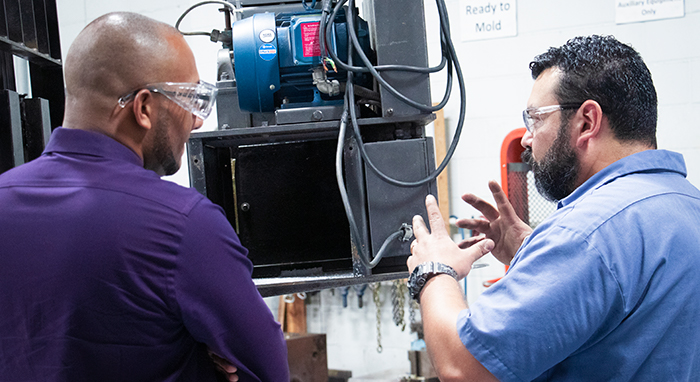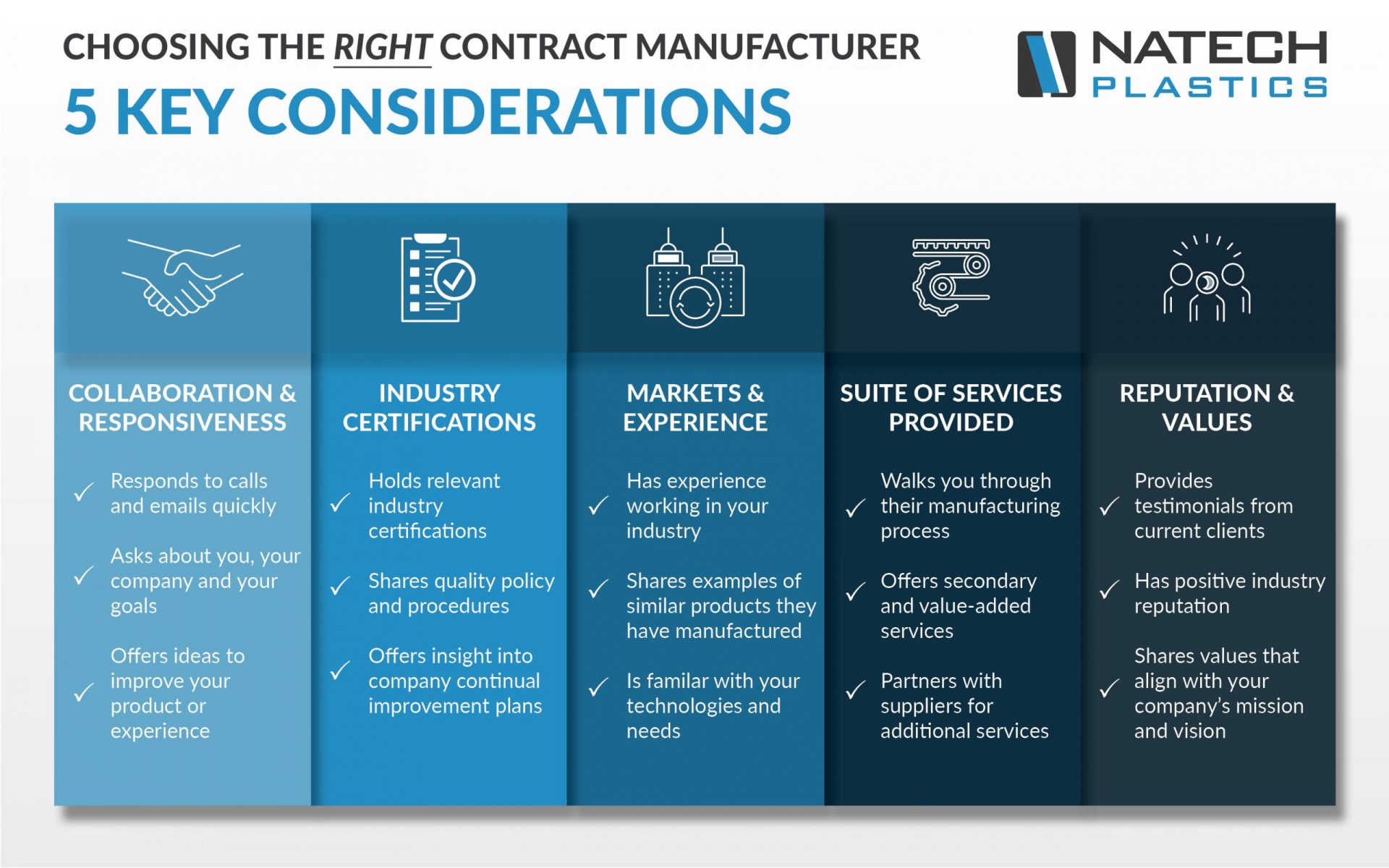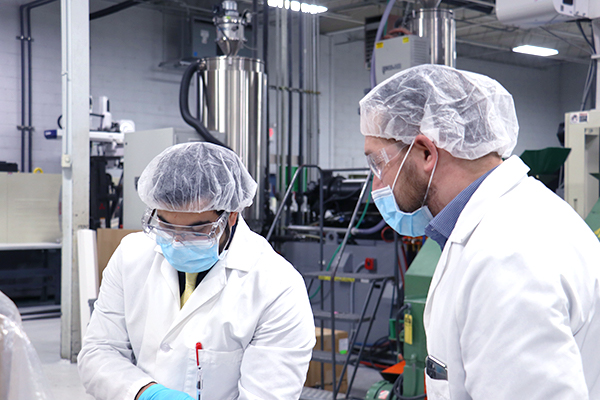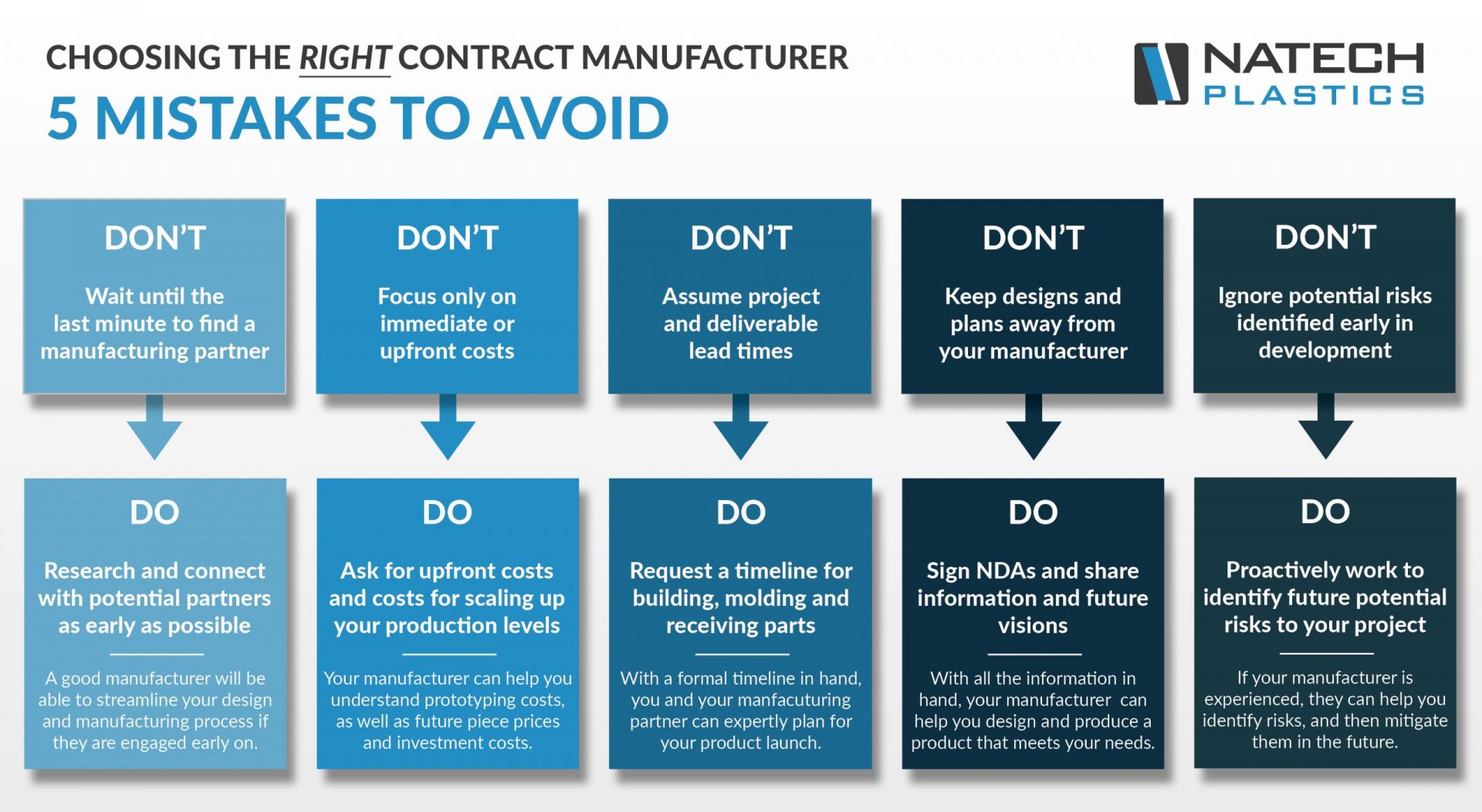
How to Select the Right Contract Manufacturer
Best practices for selecting the right partner for your plastic device development project
This article, “A Contract Manufacturer Selection Handbook,” was originally published in MPO (Medical Product Outsourcing) Magazine on May 13, 2021
By Ashley Turrell, Director of Marketing & Strategy, Natech Plastics
When designing a new or novel product, a key piece of your product development success is your manufacturing supply chain. It may not necessarily be hard to find a contract manufacturer for your project; the real challenge is finding the right manufacturer for your project. Selecting the right companies to partner with means enhanced functionality for your product and elevated success for your company.
Your manufacturing partner impacts everything from mold design, part functionality, part aesthetics, and material usage to piece price, part quality, and overall speed to market.
Get it right early on in your design process, and you are setting yourself and your team up for success. Getting it wrong can mean increased costs, longer lead times, lower quality, and increased risks. There are thousands of contract manufacturers just in the United States and selecting the right one can be an overwhelming process. This article will help you understand how to select the right manufacturing partner the first time.

Five Signs You Found the Right Contract Manufacturer
1. They are responsive from the beginning.
Decide early on what you are looking for from your manufacturing partner and what type of partnership you want. Do you want someone to be with you from design to final product? Are you looking for a long-term partnership? If you answered yes to either of these questions, then pay close attention to the company’s overall responsiveness and eagerness to work with you from day one.
A contract manufacturer interested in a long-term partnership will be collaborative, responsive, and eager to work with you from your very first outreach. If they are delayed in getting back to your emails or calls, seem pushy or distracted in the beginning, then beware. This behavior likely won’t change once they’ve won your business. Early stage collaboration is an indication of their overall investment in your project’s success.
Companies interested in truly being a collaborator and partner will show you this through their interactions with you from the very beginning.
2. They hold industry certifications and quality systems.
Depending on your product’s application, you may need your contract manufacturer to follow some required industry standards and certifications. These certifications are issued by independent bodies, such as the International Standards Organization (ISO) or the Food & Drug Administration (FDA). Receiving these certifications is optional and requires a dedication to continual improvement, customer service, and quality
Manufacturers that carry these standards have a proven track record of quality, efficiency, and compliance. Achieving and maintaining these certifications can give you confidence your manufacturer has proven they are proficient in specific manufacturing and quality practices.
At a minimum, look for a contract manufacturer with ISO 9001 certification. This certification outlines their quality management system and demonstrates their commitment to providing quality products. Beyond that, specific products, especially in the medical field, likely require you to work with a manufacturer who is ISO 13485 certified and/or an FDA-registered manufacturer.

3. They have experience serving your industry.
Seek a partner who has experience in your product’s specific market. This will allow you to work with someone who understands your needs, potential product risks, technology applications, and recommend suppliers to help your product along the way.
Some companies specialize in just one or two industries, while others serve broader markets. Depending on your product, you want a manufacturer who has the right experience to help you. For instance, if you have a medical device, you will want a manufacturer who has developed, designed, and manufactured medical devices in the past. If you are a startup or are new to partnering with a contract manufacturer, you want a partnership with a company that has worked with other startups in the past to launch their products.
Ask about their experience with products or markets like yours. They should be able to provide case studies and examples to showcase their expertise.
4. They offer a suite of engineering and manufacturing services.
When you approach a potential contract manufacturer to discuss your project, they should help you walk through their manufacturing process and explain how they can assist you through the product development process. Some companies offer only injection molding, while others can help you in the early stages during design and into the post-manufacturing steps, such as decorating, assembling, filling, sealing, and packaging.
The suite of manufacturing services offered should match your product’s needs and eliminate the need for more complex or unreliable supply chains. Additionally, a reputable contract manufacturer will be able to recommend companies for any services they are not able to provide.

5. Their values align with yours.
Based on your company’s values, both companies’ core values should align for a perfect partnership. Look for overall company values alignment. Ask potential manufacturing partners about their company’s core values. After which, ask for examples of how they maintain and live those values through their daily working interactions. A company that values innovation should be able to share how they support and execute innovative ideas, continued learning, and new technologies. They will also be able to provide you with client testimonials and success stories that further highlight their core values in practice.
When your values align with your supplier’s values, you have a higher chance at success, better communication, and increase trust between your two organizations. A values misalignment could lead to trouble down the road in terms of sourcing, quality issues, missed deadlines, and miscommunication.
Five Mistakes to Avoid in the Selection Process
As you look to select the right plastics manufacturer for your project, it is not always enough to know what to look for. You should also be mindful and avoid the pitfalls and mistakes others have made. We asked our team to share the most common mistakes they see clients make when choosing a contract manufacturer.

1. Waiting Until the Last Minute
Understand that finding the right contract manufacturer for your project may take more time than you anticipated. Additionally, once you have selected a manufacturer, it can take anywhere from a few weeks to several months before you have a final product in hand. Companies interested in a true partnership will want time to review your designs and product plans, and help optimize your design for manufacturing.
The sooner in your product development phase you find a manufacturer with which to partner, the easier your transition into manufacturing will be. Additionally, your manufacturer should be able to guide you through design, material selection, piece pricing, etc. They may also be able to refer you to others who can expedite your overall product launch.
2. Not Preparing for Future Costs
Don’t get blindsided by large future investment costs. Instead, early in the process, ask your manufacturer about what scaling your product would entail. A responsible partner will outline your initial costs for low-volume tooling, production, and overall piece price. Additionally, they should help your team understand how much it will take to invest in a full-scale production tool, as well as the new piece prices you should anticipate down the line. This will allow you to responsibly plan your future investments for your product.
3. Not Getting Clear Current and Future Lead Times
As with future costs, not understanding future lead times for your project can lead to major disruption and headaches down the road. If your goal is to ultimately scale your project from prototype and small-volume production to more complex and high-volume manufacturing, you need to find out the lead times for that type of growth.
Depending on your plans for growth, you may see additional lead times while partners purchase equipment, manufacture new tooling, train employees, create manufacturing cells, or innovate a new process for your application.
Ask your manufacturer not only about current leads times, but lead times for expanding your manufacturing in the future. This will allow you to manage expectations, plan for change, and avoid lag time in your product development and launch.
4. Not Sharing Information Upfront
The more information you give your manufacturing partner in the beginning of your relationship, the happier you’ll be in the end. On occasion, clients choose to hold back information for several reasons, including uncertainty about the future, fear of IP being stolen, or lack of knowledge on a subject.
In general, if you have selected the right manufacturer and have them sign an NDA, you should feel comfortable sharing your plans and information. By sharing in the beginning, your manufacturing partner can help you plan for the future, reduce risks of failure points, and enhance your overall product design and functionality.
5. Ignoring Risks
If your contract manufacturer has deep experience with scaling production, they should be able to identify potential risks and communicate them to you in advance. Ignoring those warnings works against you.
You want to make sure you understand those risks, their likelihood, and their impact. Then you can bring the right people together to assess mitigation factors and what level of risk to accept. You may decide to proceed as a test, or you may prefer to avoid altogether.
14 Questions to Ask Your Potential Contract Manufacturing Partner
Use the list below to find the right contract manufacturer for your organization. Use these questions to help compare your options in contract manufacturing companies.
Contract Manufacturer-Specific Questions
1. Do you hold any industry certifications?
Look for companies with ISO certifications as they have invested and have a proven track record of supplying quality products to customers.
2. How many machines and what are your capabilities?
Look for organizations that have enough machines to meet your volume requirements, and the in-house capabilities to go from design to production.
3. How do you ensure overall part quality?
Look for manufacturers who have an iterative approach to quality, a formal quality management system, and necessary equipment to properly measure and ensure the product meets your specifications.
4. What industries do you specialize in serving?
Look for a contract manufacturing partner with experience in your product-specific industry. These manufacturers will have the knowledge to help bring your project to life without major learning curves.
5. What technologies do you utilize?
Look for a company that utilizes technologies that enhance their process and your overall end product. This can range from their ERP system to innovations with their machines and their use of automation and robotics to streamline operations.
6. What value-added services can you provide?
Look for a contract manufacturer that can do more than just mold your product. If you are looking for a strategic partner, look for companies that offer services to help you upfront, such as Moldflow analysis and Design for Manufacturing reviews, to post-production services such as part decorating, sealing, and assembly.
7. Can I visit or tour your facility?
Look for a company that welcomes you anytime into their facility. If a physical visit isn’t possible, ask for a virtual tour. You want an organization that doesn’t shy away from visitors, but rather welcomes you into their operations.
Project-Specific Questions
8. What lead times can I anticipate?
Asking about lead times can allow you to be prepared for the future and plan for your product launch. Your manufacturer should be able to give you lead times for each stage of your project, including design, tool build, sampling, and production.
9. Have you worked on similar projects in the past?
Asking about their experience on similar projects will help you understand how well versed they are in your industry or market. You may also uncover experiences that can help you reduce risks with your own project.
10. Can you help with design and sourcing?
Asking about additional services will allow you to see how much additional leg work in supplier sourcing you have ahead of you. Your manufacturer may have the ability to assist in your overall product design, as well as recommend additional, trusted resources and suppliers for you to connect with.
11. What kind of updates can I expect?
Asking about updates early can help you set expectations with your manufacturing partner. A responsible partner will be able to give you regular updates on your project status and be responsive to your communication needs.
12. What guarantee do you have on the life of molds?
Asking about the life of your mold will help you plan and budget for the future. Depending on your project, they may recommend a prototype mold with a shorter lifespan, but a smaller upfront investment, or a production-level mold that lasts longer, but comes with a heftier initial price tag. Discuss your options thoroughly and be better positioned for the future of your product.
13. What will my costs be at my current and future volumes?
Asking about your costs, not just initial, but for the future, will allow you the opportunity to budget for your investment. Additionally, your manufacturing partner should be able to help you understand your piece pricing across the various production volumes, and help you identify opportunities to save money.
14. Who will be supporting my project and communicating with me?
Asking about your main point of contact and the team supporting your project will give you additional insight into what type of partnership you are getting. Look for a manufacturer where you will have one primary point of contact who will be communicating with you and responsible for your product. Rather than getting handed off from one person to the next, having a single point of contact saves you time and helps to build trust and a longer-lasting relationship.
Next Steps
Selecting the right manufacturing partner doesn’t have to be daunting. Instead, it gives you and your team the chance to further understand what the future of your project will look like. When beginning your outreach to manufacturers, ask lots of questions and trust your intuition. Manufacturers who want to partner with you will be helpful, receptive, and ready to guide you through the product development process.
Natech specializes in helping companies bring their ideas from drawing to final product. Talk to one of our engineers and see whether Natech Plastics is the right manufacturing partner for you.